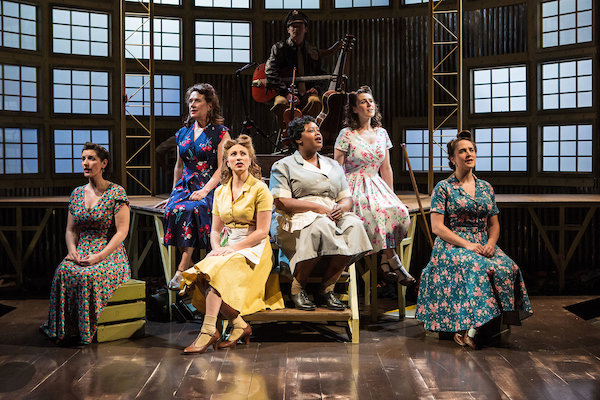
REVIEW
A well-worn, waxed and polished plank factory floor bears a faded inscription, “Loose lips sink ships.” It invites us to the story of the women of World War II who built B-52 bombers at a plant in Ypsilanti’s Willow Run airport in the early to mid ‘40s.
Purple Rose Theatre’s current production of this oft- forgotten moment in history gives us an up front and personal recollection — a time when women emerged out of households bereft of men who were at war. A time to take over the important tasks of riveting and assembling airplanes at a hard-to-believe rate of hundreds a day.
An ensemble of six arrive onstage in shadows, and as lights come up, we see they are costumed in white bobby-socks. This was the era of women wearing billowing flowery dresses.
Each of the woman is unique. They come from near and far; two from the deep south reflect differing black and white experiences. There is a hairdresser, another who has been a maid, one a college student and another whose work was that of a parent at home. All are poised to become varied versions of “Rosie-the-Riveter.”
There is a marriage of true minds at play here. Jeff Duncan’s carefully written words are honed to stagecraft perfection by Purple Rose artistic director Guy Sanville. He moves actors who sing and dance across a tiny space in a manner that makes small appear large.
Yes, this is a micro musical with creative musical numbers contributed by Jeff and Ben Daniels and guitarist-actor Brad Phillips.
Historic plot points are presented: the volume of planes produced, a blood drive and the threat of a strike when women are informed they must cover up their “pulchritude” because they are distracting male workers.
Michelle Mountain, in the role of Donna Malone, leads the ensemble agitating for worker’s clothing rights especially the iconic Rosie bandana. David Bendena, in the role of the unit supervisor, is backed down into an impossible corner until he relents, allowing them to wear whatever they damn well want. Mountain makes for an engaging and energetic floor leader with unquenchable enthusiasm and excitement.
K. Edmonds as Berenice Summers comes to the plant having suffered in the South the indignities heaped upon black maids, house servants. She is confronted by “white trash” Rhiannon Ragland, in the role of Liz Marie Calhoun, who, in a scene where the Red Cross is organizing a blood drive, notes perceived differences in the quality of black blood and white. Summers does not suffer fools gladly and subsequent tensions between she and Calhoun enrich the dramatic aspects of this play. A scene of resolution late in the play brings “if only” tears to one’s eyes.
Lauren Knox as Evelyn Stillwell is a college educated woman who imagines, at first, a more genteel factory job, a clerk or secretary in the plant. She eventually succumbs to persuasive confrontations from the other women to allow herself to get her hands dirty doing more important work. Knox is a principal dancer in the group. She leads the women in a choreography of dances fashioned by Ragland.
These four women are flanked by two men, both of whom do double duty as guitarists and characters. Brad Phillips, costumed as a pilot, does most of the heavy background lifting on virtuosity guitar. In a scene noting the grief and losses that accompany war, he surprises the audience by stepping down on to center stage to perform a complex dance number with Knox. David Bendena plays multiple featured roles throughout the play, each with considerable versatility, then steps back at times to play an accompanying guitar.
Sarah Perline’s set design begins with that polished factory floor. It sweeps up to a skylight with hanging airplane engines and propellers, defining the spaciousness of an actual bomber plant.
Noele Stollmack’s lighting adds shadows that nuance the set design.
We do not give sufficient credit to those women of war who built the bombers, who did immeasurable defense work and who paved the way for a wide range of equalities that are more visible today. I remember my own mother and her work in defense during the war.
Here’s to you, mom, recognition long overdue.
Support City Pulse - Donate Today!
Comments
No comments on this item Please log in to comment by clicking here